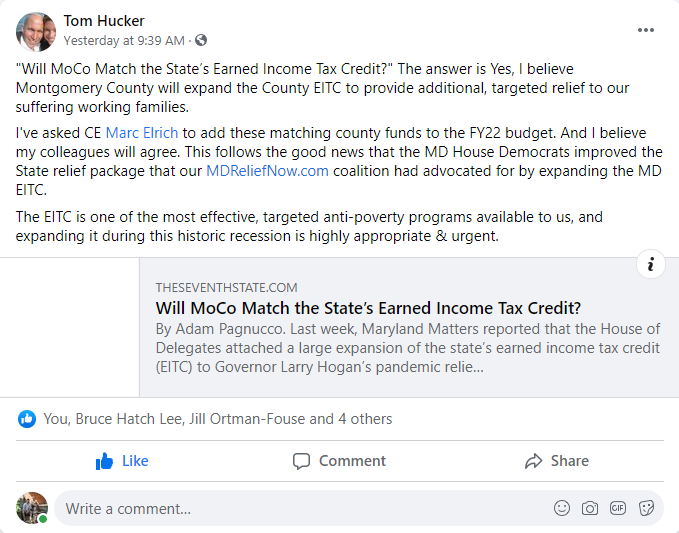By Adam Pagnucco.
Last week, Maryland Matters reported that the House of Delegates attached a large expansion of the state’s earned income tax credit (EITC) to Governor Larry Hogan’s pandemic relief bill. That’s good news for working class people in Maryland. It’s also complicated news for Montgomery County’s leadership.
That’s because MoCo is one of the few local jurisdictions in the nation that has a local EITC. The county’s EITC is tied to the state’s by county law. If the state’s EITC grows, so might MoCo’s.
MoCo’s EITC (called the Working Families Income Supplement) was first proposed in 1999 by then-County Executive Doug Duncan. Freshman Council Member Phil Andrews had introduced living wage legislation for county contractor employees that Duncan opposed, so Duncan came up with an alternative package including a county EITC. In the end, the county council passed both the living wage law and the EITC and both remain on the books today.
The county EITC was originally specified to provide a 100% match for the state EITC. So if a tax filer obtained a $500 credit from the state, the filer could also obtain a $500 credit from the county. That framework prevailed until the county got into budget trouble during the Great Recession. In 2010, the council passed legislation decoupling the county EITC from the state EITC and making it subject to whatever appropriation the council wanted to pass for it. By FY12, the EITC’s value had shrunk to 68.9% of the state’s credit. In 2013, Council Member Hans Riemer introduced a bill phasing in a restoration of the county EITC to 100% of the state’s EITC, which passed. (Disclosure: I was Riemer’s chief of staff at the time.)
The county code now contains the following language on setting the level of the county EITC.
Sec. 20-79. Amount of Supplement.
(a) Subject to subsection (b), the amount of the Working Families Income Supplement paid to each recipient must equal the amount of any refund the recipient receives from the State earned income credit program.
(b) The Council may approve a different amount in the annual operating budget by an affirmative vote of at least five Councilmembers.
According to Maryland Matters, the value of the state’s EITC is set to increase by a range of 28% to 45% for three years. Under current county law, the county’s EITC “must” match it unless the county council decides differently. Whether the county’s EITC rises too depends on whether the county executive remembers to put it in his recommended budget and whether the council votes to approve it.
Needless to say, this is a very big deal for MoCo’s working class residents.
Among its many virtues, the EITC is well suited to the unique circumstances of the COVID recession. Consider this recession’s quintessential victim: the payroll employee who is laid off and now works in the gig economy to make ends meet. What assistance program is best targeted to help this person? Unemployment benefits might help but they have eligibility requirements and limited duration. Assistance to the employer might help but only if the worker is rehired. Rental assistance might help but only if the worker knows to apply for it and only if the landlord wants to accept it. (Some don’t.) Language barriers and outreach issues are further complications.
In contrast, anyone who files an income tax return can claim the EITC. It applies to all earned income, not just to payroll income. No new program needs to be set up, no bureaucrats need to be hired and no federal grants need to be administered. The county already has a volunteer income tax assistance program to help low and moderate income county residents claim it. And because we are in tax season, the timing is right for the EITC to put money into the pockets of those who need it right away. According to the comptroller’s office, electronic filers can get their refunds a few days after they file returns. Compare that to the weeks and sometimes months required to process and disburse county grant applications.
There is one drawback: the EITC costs money. In FY21, the county budgeted $20 million to pay it. If MoCo matches the proposed state increase, the county might have to pay an extra $6-9 million a year for three years. That doesn’t sound like much in a nearly $6 billion county budget, but the county does have revenue pressures and a new whopping $100 million a year liability in COVID emergency pay.
Tough times require tough choices. Workers who have seen their incomes plummet during the pandemic know that better than anyone. Expanding the EITC is one of the best ways to target assistance to them in their time of need. Will MoCo leaders make the tough budget choices to help them?


